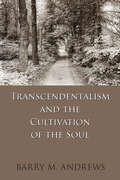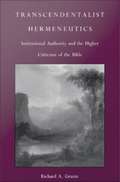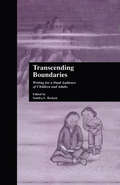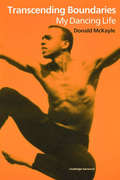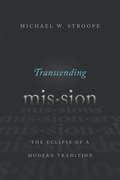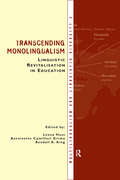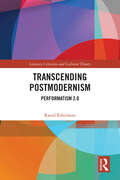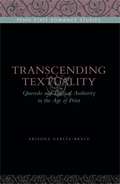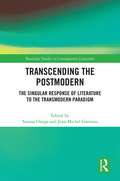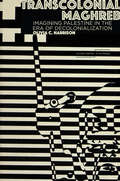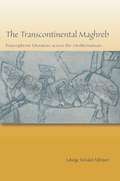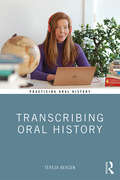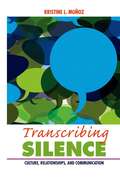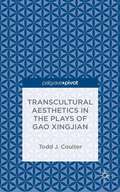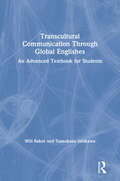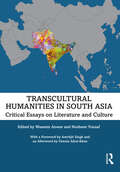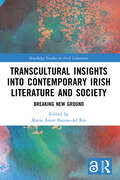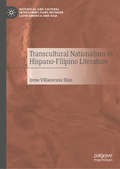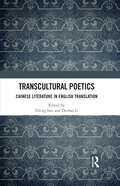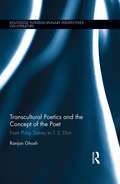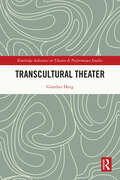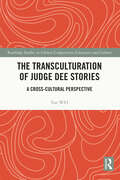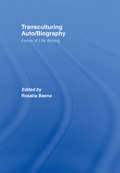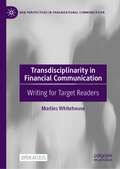- Table View
- List View
Transcendentalism and the Cultivation of the Soul
by Barry M. AndrewsA study of the spiritual practices developed by the nineteenth-century American Transcendentalist movement and a case for their necessity today.“The stern old faiths have all pulverized,” Ralph Waldo Emerson wrote in 1860. “‘Tis a whole population of gentlemen and ladies out in search of religions.” Often seen as a mainspring of the nineteenth-century literary tradition and the preserve of New England intellectuals in retreat from society, American Transcendentalism is more accurately described as a religious movement. In Transcendentalism and the Cultivation of the Soul, Barry M. Andrews shows how Transcendentalists developed rich spiritual practices, nurtured their souls, and discovered the divine. The practices they adopted are common and simple—among them, keeping journals, contemplation, walking, reading, simple living, and conversation. As Emerson, Thoreau, Fuller, and others pursued meaningful and rewarding spiritual lives, they were inspired to fight for abolition, women’s rights, and education reform. In approachable and accessible prose, Andrews uncovers a wealth of spiritual practices that are of particular value for today’s spiritual seekers and religious liberals.
Transcendentalist Hermeneutics: Institutional Authority and the Higher Criticism of the Bible
by Richard A. GrusinAmerican literary historians have viewed Ralph Waldo Emerson's resignation from the Unitarian ministry in 1832 in favor of a literary career as emblematic of a main current in American literature. That current is directed toward the possession of a self that is independent and fundamentally opposed to the "accoutrements of society and civilization" and expresses a Transcendentalist antipathy toward all institutionalized forms of religious observance. In the ongoing revision of American literary history, this traditional reading of the supposed anti-institutionalism of the Transcendentalists has been duly detailed and continually supported. Richard A. Grusin challenges both traditional and revisionist interpretations with detailed contextual studies of the hermeneutics of Ralph Waldo Emerson, Henry David Thoreau, and Theodore Parker. Informed by the past two decades of critical theory, Grusin examines the influence of the higher criticism of the Bible--which focuses on authorship, date, place of origin, circumstances of composition, and the historical credibility of biblical writings--on these writers. The author argues that the Transcendentalist appeal to the authority of the "self" is not an appeal to a source of authority independent of institutions, but to an authority fundamentally innate.
Transcending Boundaries: Writing for a Dual Audience of Children and Adults (Children's Literature and Culture #Vol. 13)
by Sandra L. BeckettTranscending Boundaries: Writing for a Dual Audience of Children and Adults is a collection of essays on twentieth-century authors who cross the borders between adult and children's literature and appeal to both audiences. This collection of fourteen essays by scholars from eight countries constitutes the first book devoted to the art of crosswriting the child and adult in twentieth-century international literature. Sandra Beckett explores the multifaceted nature of crossover literature and the diverse ways in which writers cross the borders to address a dual readership of children and adults. It considers classics such as Alice's Adventures in Wonderland and Pinocchio, with particular emphasis on post-World War II literature. The essays in Transcending Boundaries clearly suggest that crossover literature is a major, widespread trend that appears to be sharply on the rise.
Transcending Boundaries: My Dancing Life (Choreography And Dance Studies #Vol. 22)
by Donald McKayle"First Published in 2002, Routledge is an imprint of Taylor & Francis, an informa company."
Transcending Mission: The Eclipse of a Modern Tradition
by Michael W. StroopeMission, missions, missional, and all its linguistic variations are part of the expanding vocabulary and rhetoric of the contemporary Christian missionary enterprise. Its language and assumptions are deeply ingrained in the thought and speech of the church today. Christianity is a missionary religion and faithful churches are mission-minded. What's more, in telling the story of apostles and bishops and monks as missionaries, we think we have grasped the true thread of Christian history. But what about those odd shapes, those unsettling gaps and creases in the historical record? Is the language of mission so clearly evident across the broad reaches of time? Is the trajectory of mission really so explicit from the early church to the present? Or has the modern missionary enterprise distorted our view of the past? As with every reigning paradigm, there comes a point when enough questions surface to beg for a close and critical look, even when it may seem transgressive to do so. In this study of the language of mission—its origin, development, and application—Michael Stroope investigates how the modern church has come to understand, speak of, and engage in the global expansion of Christianity. There is both surprise and hope in this tale. And perhaps the beginnings of a new conversation.
Transcending Monolingualism: Linguistic Revitalization in Education
by Leena Huss Antoinette Camilleri Grima Kendall A. KingThis volume describes a wide range of educational situations where linguistic revitalization is currently taking place.
Transcending Postmodernism: Performatism 2.0 (Literary Criticism and Cultural Theory)
by Raoul EshelmanTranscending Postmodernism: Performatism 2.0 is an ambitious attempt to expand and deepen the theory of performatism. Its main thesis is that, beginning in the mid-1990s, the strategies and norms of postmodernism have been displaced by ones that force readers or viewers to experience effects of aesthetically mediated transcendence. These effects include specific temporal strategies (“chunking”), stylizing separated subjectivity (the genius and the fool being its two main poles) and orienting ethics toward actions taken by centered agents bearing a sacral charge. The book provides a critical overview of other theories of post-postmodernism, and suggests that among five text-oriented theories there is basic agreement on its techniques and strategies.
Transcending Textuality: Quevedo and Political Authority in the Age of Print (Penn State Romance Studies)
by Ariadna García-BryceIn Transcending Textuality, Ariadna García-Bryce provides a fresh look at post-Trent political culture and Francisco de Quevedo’s place within it by examining his works in relation to two potentially rival means of transmitting authority: spectacle and print. Quevedo’s highly theatrical conceptions of power are identified with court ceremony, devotional ritual, monarchical and spiritual imagery, and religious and classical oratory. At the same time, his investment in physical and emotional display is shown to be fraught with concern about the decline of body-centered modes of propagating authority in the increasingly impersonalized world of print. Transcending Textuality shows that Quevedo’s poetics are, in great measure, defined by the attempt to retain in writing the qualities of live physical display.
Transcending the Postmodern: The Singular Response of Literature to the Transmodern Paradigm (Routledge Studies in Contemporary Literature)
by Susana OnegaTranscending the Postmodern: The Singular Response of Literature to the Transmodern Paradigm gathers an introduction and ten chapters concerned with the issue of Transmodernity as addressed by and presented in contemporary novels hailing from various parts of the English-speaking world. Building on the theories of Transmodernity propounded by Rosa María Rodríguez Magda, Enrique Dussel, Marc Luyckx Ghisi and Irena Ateljevic, inter alia, it investigates the links between Transmodernity and such categories as Postmodernity, Postcolonialism and Transculturalism with a view to help define a new current in contemporary literary production. The chapters either follow the main theoretical drives of the transmodern paradigm or problematise them. In so doing, they branch out towards various issues that have come to inspire contemporary novelists, among which: the presence of the past, the ascendance of new technologies, multiculturalism, terrorism, and also vulnerability, interdependence, solidarity and ecology in a globalised context. In so doing, it interrogates the ethics, aesthetics and politics of the contemporary novel in English.
Transcolonial Maghreb
by Olivia HarrisonTranscolonial Maghreb offers the first thorough analysis of the ways in which Moroccan, Algerian, and Tunisian writers have engaged with the Palestinian question and the Palestinian-Israeli conflict for the past fifty years. Arguing that Palestine has become the figure par excellence of the colonial in the purportedly postcolonial present, the book reframes the field of Maghrebi studies to account for transversal political and aesthetic exchanges across North Africa and the Middle East. Olivia C. Harrison examines and contextualizes writings by the likes of Abdellatif Laâbi, Kateb Yacine, Ahlam Mosteghanemi, Albert Memmi, Abdelkebir Khatibi, Jacques Derrida, and Edmond El Maleh, covering a wide range of materials that are, for the most part, unavailable in English translation: popular theater, literary magazines, television series, feminist texts, novels, essays, unpublished manuscripts, letters, and pamphlets written in the three main languages of the Maghreb--Arabic, French, and Berber. The result has wide implications for the study of transcolonial relations across the Global South.
The Transcontinental Maghreb: Francophone Literature across the Mediterranean
by Edwige Tamalet TalbayevThe writer Gabriel Audisio once called the Mediterranean a “liquid continent.” Taking up the challenge issued by Audisio’s phrase, Edwige Tamalet Talbayev insists that we understand the region on both sides of the Mediterranean through a “transcontinental” heuristic. Rather than merely read the Maghreb in the context of its European colonizers from across the Mediterranean, Talbayev compellingly argues for a transmaritime deployment of the Maghreb across the multiple Mediterranean sites to which it has been materially and culturally bound for millennia.The Transcontinental Maghreb reveals these Mediterranean imaginaries to intersect with Maghrebi claims to an inclusive, democratic national ideal yet to be realized. Through a sustained reflection on allegory and critical melancholia, the book shows how the Mediterranean decenters postcolonial nation-building projects and mediates the nomadic subject’s reinsertion into a national collective respectful of heterogeneity. In engaging the space of the sea, the hybridity it produces, and the way it has shaped such historical dynamics as globalization, imperialism, decolonization, and nationalism, the book rethinks the very nature of postcolonial histories and identities along its shores.
Transcribing Oral History (Practicing Oral History)
by Teresa BergenTranscribing Oral History offers a comprehensive guide to the transcription of qualitative interviews, an often richly debated practice within oral history. Beginning with an introduction to the field and an overview of the many disciplines that conduct and transcribe interviews, the book goes on to offer practical advice to those looking to use transcription within their own projects. A helpful how-to section covers technology, style guides, ways to format transcripts and troubleshoot the many problems that can arise. In addition to the practicalities of transcription itself, the book encourages the reader to consider legal and ethical issues, and the effects of troubling audio on the transcriptionist. It explains how scholars can turn recorded interviews and transcripts into books, films and museum exhibits, enabling the reader to understand the wider concerns surrounding transcription as well as the practical uses to which it can be put. Based upon the author’s personal experience as a freelance transcriptionist and interviews with more than 30 professionals working around the world in the oral history and qualitative research fields, this is an indispensable guide for those involved in interviews and transcription at any level of an oral history project, including historians, transcriptionists, interviewers, project administrators, archivists, researchers and students.
Transcribing Silence: Culture, Relationships, and Communication (Writing Lives: Ethnographic Narratives)
by Kristine L MuñozKristine Muñoz’s volume of short narrative works-- autoethnographies and fictional stories—explore many dimensions of silence, a crucial but often overlooked communication phenomenon, one that drives much of everyday talk and relationships. Framed by an introductory essay that synthesizes research on silence and the unsaid, guides for reflection and expansion after each narrative, and a conclusion that ponders ethnographic writing, this volume is an essential work for those who study and teach interpersonal communication.
Transcribing the Sound of English: A Phonetics Workbook for Words and Discourse
by Paul TenchDo you have a fear of transcription? Are you daunted by the prospect of learning and handling unfamiliar symbols? This workbook is for students who are new to linguistics and phonetics, and offers a didactic approach to the study and transcription of the words, rhythm and intonation of English. It can be used independently or in class and covers all the pronunciation details of words, phrases, rhythm and intonation. Progress is deliberately gentle with plenty of explanations, examples and 'can't go wrong' exercises. In addition, there is an associated website with audio recordings of authentic speech, which provide back-up throughout. The audio clips also introduce students to variations in accents, with eleven different speakers. Going beyond the transcription of words, the book also ventures into real discourse with the simplification systems of colloquial English speech, rhythm and intonation.
Transcultural Aesthetics in the Plays of Gao Xingjian
by Todd J. CoulterGao Xingjian has been lauded for his inventive use of Chinese culture in his paintings, plays, and cinema, however he denies that his current work participates in any notion of Chinese. This book traces the development of these forms and how the relate and interact in the French language plays of the Nobel Laureate.
Transcultural Communication Through Global Englishes: An Advanced Textbook for Students
by Will Baker Tomokazu IshikawaThis textbook introduces current thinking on English as a global language and explores its role in intercultural and transcultural communication. It covers how English functions as a lingua franca in multilingual scenarios alongside other languages in a wide variety of global settings, and the fluid and dynamic links between English, other languages, and cultural identities and references. The implications for English language teaching (ELT), academia, business, and digital communication are explored. Contemporary research and theory are presented in an accessible manner, illustrated with examples from current research, and supported with discussions and tasks to enable students to relate these ideas to their own experiences, needs, and interests. Each chapter contains activities to help students orientate towards the topic, reflect on personal experiences and opinions, and check their understanding; Additionally, a detailed glossary of key terminology in Global Englishes and Intercultural Communication is provided. Exploring in depth the links between Global Englishes, Intercultural Communication research, and Transcultural Communication reasearch, this is key reading for all advanced students and researchers in Global or World Englishes, English as a Lingua Franca (ELF), and Intercultural Communication.
Transcultural Humanities in South Asia: Critical Essays on Literature and Culture
by Waseem Anwar Nosheen YousafThis volume looks at the implications of transcultural humanities in South Asia, which is becoming a crucial area of research within literary and cultural studies. The volume also explores various complex critical dimensions of transculturation, its indeterminate periodisation, its temporal and spatial nonlinearity, its territoriality and intersectionality. Drawing on contributors from around the globe, the entries look at literature and poetics, theory and praxis, borders and nations, politics, Partition, gender and sexuality, the environment, representations in art and pedagogy and the transcultural classroom. Using key examples and case studies, the contributors look at current developments in transcultural and transnational standpoints and their possible educational outcomes. A broad and comprehensive collection, as it also speaks about the value of the humanities and the significance of South Asian contexts, Transcultural Humanities in South Asia will be of particular interest to those working on postcolonial studies, literary studies, Asian studies and more.
Transcultural Insights into Contemporary Irish Literature and Society: Breaking New Ground (Routledge Studies in Irish Literature)
by Río, María Amor Barros-delTranscultural Insights into Contemporary Irish Literature and Society examines the transcultural patterns that have been enriching Irish literature since the twentieth century and engages with the ongoing dialogue between contemporary Irish literature and society. Driven by the growing interest in transcultural studies in the humanities, this volume provides an insightful analysis of how Irish literature handles the delicate balance between authenticity and folklore, and uniformisation and diversity in an increasingly globalised world. Following a diachronic approach, the volume includes critical readings of canonical Irish literature as an uncharted exchange of intercultural dialogues. The text also explores the external and internal transcultural traits present in recent Irish literature, and its engagement with social injustice and activism, and discusses location and mobility as vehicles for cultural transfer and the advancement of the women’s movement. A final section also includes an examination of literary expressions of hybridisation, diversity and assimilation to scrutinise negotiations of new transcultural identities. In the light of the compiled contributions, the volume ends with a revisitation of Irish studies in a world in which national identity has become increasingly problematic. This volume presents new insights into the fictional engagement of contemporary Irish literature with political, social and economic issues, and its efforts to accommodate the local and the global, resulting in a reshaping of national collective imaginaries.
Transcultural Nationalism in Hispano-Filipino Literature (Historical and Cultural Interconnections between Latin America and Asia)
by Irene Villaescusa IllánThis book studies a selection of works of Philippine literature written in Spanish during the American occupation of the Philippines (1902-1946). It explores the place of Filipino nationalism in a selection of fiction and non-fiction texts by Spanish-speaking Filipino writers Jesús Balmori, Adelina Gurrea Monasterio, Paz Mendoza Guazón, and Antonio Abad. Taking an interdisciplinary approach that draws from Anthropology, History, Literary Studies, Cultural Analysis and World Literature, this book offers a comparative analysis of the position of these authors toward the cultural transformations that have taken place as a result of the Philippines' triple history of colonization (by Spain, the US, and Japan) while imagining an independent nation. Engaging with an untapped archive, this book is a relevant and timely contribution to the fields of both Filipino and Hispanic literary studies.
Transcultural Poetics: Chinese Literature in English Translation
by Yifeng Sun Dechao LiThis book examines many facets of transcultural poetics in the English translation of Chinese literature from 12 different expert contributors.Translating Chinese literature into English is a special challenge. There is a pressing need to overcome a slew of obstacles to the understanding and appreciation of Chinese literary works by readers in the English-speaking world. Hitherto only intermittent attempts have been made to theorize and explore the exact role of the translator as a cultural and aesthetic mediator informed by cross-cultural knowledge, awareness, and sensitivity. Given the complexity of literary translation, sophisticated poetics of translation in terms of literary value and aesthetic taste needs to be developed and elaborated more fully from a cross-cultural perspective. It is, therefore, necessary to examine attempts to reconcile the desire for authentic transmission of Chinese culture with the need for cultural mediation and appropriation in terms of the production and reception of texts, subject to the multiplicity of constraints, in order to shed new light on the longstanding conundrum of Chinese-English literary translation by addressing Chinese literature in the multiple contexts of nationalism, cross-cultural hybridity, literary untranslatability, the reception of translation, and also world literature. The book will be of great interest to students and scholars of translation studies, Chinese literature, and East Asian studies.
Transcultural Poetics and the Concept of the Poet: From Philip Sidney to T. S. Eliot (Routledge Interdisciplinary Perspectives on Literature)
by Ranjan GhoshCritiquing the politics and dynamics of the transcultural poetics of reading literature, this book demonstrates an ambitious understanding of the concept of the poet across a wide range of traditions – Anglo-American, German, French, Arabic, Chinese, Sanskrit, Bengali, Urdu – and philosophies of creativity that are rarely studied side by side. Ghosh carves out unexplored spaces of negotiation and intersections between literature, aesthetics and philosophy. The book demonstrates an original method of ‘global comparison’ that displaces the relatively staid and historicist categories that have underpinned comparative literature approaches so far, since they rarely dare stray beyond issues of influence and schools, or new 'world literature' approaches that affirm cosmopolitanism and transnationalism as overarching themes. Going beyond comparatism and reformulating the chronological patterns of reading, this bold book introduces new methodologies of reading literature to configure the concept of the poet from Philip Sidney to T. S Eliot, reading the notion of the poet through completely new theoretical and epistemic triggers. Commonly known texts and sometimes well-circulated ideas are subjected to refreshing reading in what the author calls the ‘transcultural now’ and (in)fusionised transpoetical matrices. By moving between theories of poetry and literature that come from widely separated times, contexts, and cultures, this book shows the relevance of canonical texts to a theory of the future as marked by post-global concerns.
Transcultural Theater (Routledge Advances in Theatre & Performance Studies)
by Günther HeegTranscultural Theater outlines the idea of a transcultural theater as enabling an approximation to and an interaction with the foreign and the alien. In consideration of the allure of fundamentalist and populist movements that promote the development and practices of xenophobia worldwide, this book makes a powerful plea for the art of theater as a medium of conviviality with (the) foreign(er) that should not be underestimated. This study contributes to transcultural experience, artistic practice, and education in the medium of theater. The book’s investigation extends far into space and time and pays particular attention to the relationship between aesthetic experience, artistic practice, and academic representation. This book is for scholars and students as well as for all those working in the cultural field, especially in the field of cultural transfer.
The Transculturation of Judge Dee Stories: A Cross-Cultural Perspective (Routledge Studies in Chinese Comparative Literature and Culture)
by Yan WEIThis book views the Dutch Sinologist, Robert van Gulik’s Judge Dee mysteries as a hybrid East-West form of detective fiction and uses the concept of transculturation to discuss their hybrid nature with respect to their sources, production, and influence. The Judge Dee Mysteries authored by Robert van Gulik (1910-1967) were the first detective stories to be set in ancient China. These hybrid narrative combine Chinese historical figures, traditional Chinese crime literature and Chinese history and material culture with ratiocinative methods and psychoanalytic themes familiar from Western detective fiction. This new subject and detective image won a global readership, and the book discusses the innovations that van Gulik’s Judge Dee mysteries brought to both Chinese gong’an literature and Western detective fiction. Furthermore, it introduces contemporary writers from different countries who specialize in writing detective fiction or gong’an novels set in ancient China. The book will meet the interest of fans of Judge Dee stories throughout the world, and will also appeal to both students and researchers of comparative literature, Chinese literature, and crime novels studies.
Transculturing Auto/Biography: Forms of Life Writing
by Rosalia BaenaRosalia Baena’s theoretically challenging, analytical volume of essays, explores the diversity of shapes that transcultural life writing takes, demonstrating how it has become one of the most dynamic and productive literary forms of self-inscription and self-representation. Expanding much of the contemporary criticism on life writing, which tends to centre on content, the essays highlight that reading contemporary forms of life writing from a literary perspective is a rich field of critical intervention that has been overlooked because of recent cultural studies’ concerns with material issues. To read life writing as primarily cultural texts undercuts much of its value as a complex dynamic of cultural production, where aesthetic concerns and the choice and manipulation of form serve as signifying aspects to experiences and subjectivities. This book was previously published as a special issue of Prose Studies.
Transdisciplinarity in Financial Communication: Writing for Target Readers (New Perspectives in Organizational Communication)
by Marlies WhitehouseThis open access book identifies and analyses problems of text production in finance from three complementary perspectives: problem identification, problem analysis, and problem solution. By doing so, it explains why solving these problems in transdisciplinary collaboration benefits theory, practice, and society at large. Drawing on 25 years of ethnographic research, roughly 2100 text products, and more than 190 interviews with different stakeholders, it develops and evaluates measures to improve the communicative potential of financial texts and thereby make them accessible to professionals. The book will appeal to researchers and reflective practitioners in financial communication, organizational communication, financial analysis, investor relations, journalism, and applied linguistics.
